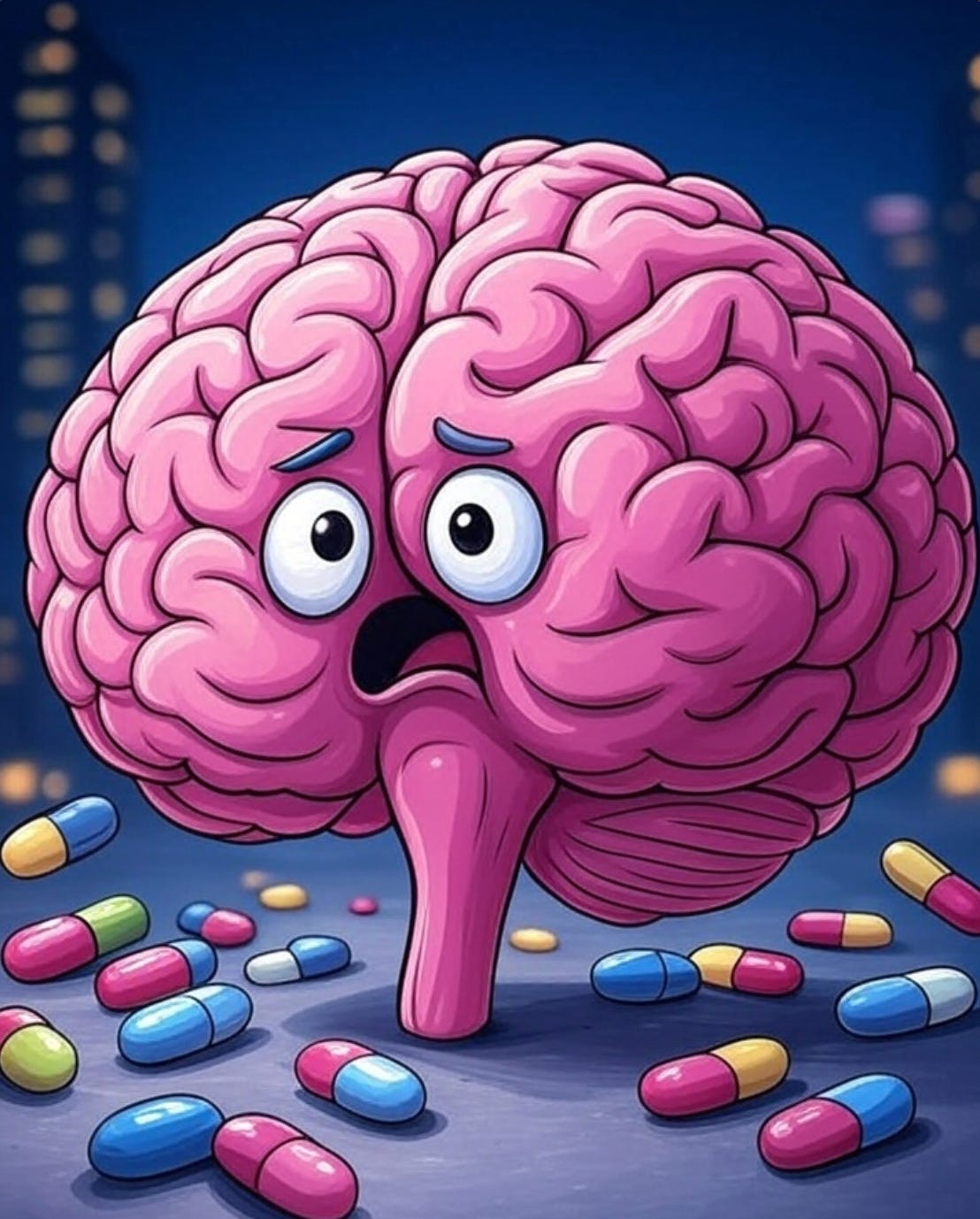Are Brain Supplements BS?
Part 1: Creatine
Brain supplements (AKA Nootropics) are substances— natural, synthetic, or prescription—that aim to enhance cognitive functions like memory, focus, creativity, and motivation. They’re popular for boosting performance in healthy people. Some have been used to ward off dementia.
Is there any scientific basis for their use? Which formulations are best? Are there natural alternatives?
Today we’ll talk about creatine.
Scientific Basis:
Creatine plays a vital role in brain energy metabolism. It facilitates conversion between (ADP) to adenosine triphosphate (ATP). These molecules are the energy currency of the neurons (brain cells). Our bodies make a certain amount of creatine every day; from amino acids (arginine, glycine, and methionine), which we obtain via diet (meat and fish).
Advocates claim that creatine boosts muscular and cognitive function. Research has verified creatine’s role in brain energy metabolism, improving short-term memory, reducing mental fatigue, and supporting mood—especially under stress, sleep deprivation, or in aging populations. Women and vegetarians/vegans may see amplified effects due to lower baseline levels.
Creatine has been the subject of scientific scrutiny for some time. In 2024, a group of Chinese scientists reported on the medical literature in order to assess the effects of creatine supplementation on cognitive function, with a particular focus on memory, executive function, attention, and processing speed. The authors synthesized the available evidence, derived from randomized controlled trials, studies designed at the highest level. They evaluated evidence based on almost five-hundred volunteers, comprised of healthy adults and patients with conditions like fibromyalgia, Parkinson’s disease, and traumatic brain injury.
The results affirm creatine’s cognitive benefits, particularly for memory, aligning with its role in brain energy homeostasis— enhancing ATP availability in high-demand tasks like recall. Improvements in attention and processing speed suggest broader utility in time-sensitive cognitive processes, potentially via reduced neural fatigue. Subgroup effects imply greater responsiveness in metabolically stressed states (disease or younger brains with higher energy demands).
Another ongoing study seeks to confirm creatine’s brain benefits: The Creatine for Alzheimer’s Disease: A Bioenergetic Approach (CABA) trial is currently assessing whether creatine supplementation may be of benefit for patients with mild-to-moderate Alzheimer’s disease (AD). Conducted by researchers at the University of Kansas Medical Center, the early stage (as of 2025) investigation builds on evidence that creatine supports brain energy metabolism, which is impaired in AD due to mitochondrial dysfunction and reduced phosphocreatine levels. Stay tuned!!!
Popular Brands:
Creatine monohydrate is the gold standard form for supplementation. A typical daily dose is between 3 and 5 grams.
Thorne Creatine stands out as the most popular option. It’s specifically marketed for brain health: neuronal energy, memory, focus and better cognition in stressed or older adults. It’s a micronized powder (unflavored, mixes easily) using pure creatine monohydrate, NSF Certified for Sport, and frequently recommended in nootropics circles for cognitive support alongside muscle gains. It’s a top Amazon best-seller in the creatine category and featured in Men’s Health and Good Housekeeping as a top pick for dual muscle-brain benefits. Thorne has quite the user Buzz: garnering 4.7+ stars for no bloating and sustained mental clarity; popular on X for long COVID and menopause brain fog relief.
Are you a vegan? Momentous Creatine, a distinct nootropic formulation that boasts improvement in cognitive function, (memory/focus under stress), is specifically marketed towards the vegan dietary preference. Made of Creapure, a vegan micronized powder.
Not into the hassle of stirring up spoonfuls of powder? Klean Creatine, formulated by Klean Athlete as capsules, may be right for you. What’s more, Klean is NSF-certified (tested for contaminants and confirmed to contain the ingredients and dosages listed on the label) and is dietician endorsed for sleep-deprived brain fog.
Natural Alternatives:
Creatine is a naturally occurring compound synthesized in the human body (primarily in the liver, kidneys, and pancreas) from amino acids like glycine and arginine, but it can also be obtained through diet. Data from USDA nutrient databases confirm that red meat (especially beef) is by far the most abundant natural source of creatine, providing the highest concentration per serving. Vegans/vegetarians often have 20-30% lower baseline creatine levels.
3.5 Ounces (less than a quarter pound) of cooked beef contains 0.45 - 0.5 grams of creatine. Beef also is rich in other brain supporting nutrients such as B12 and iron. It would take a lot of cow, though, to get to the typical supplement dose of 3 to 5 grams per day.
The same amount of pork contains a slightly lower amount of creatine: 0.4 - 0.45 grams
Salmon is up there too, boasting 0.30-0.40g of creatine per the same serving size. And the Omega-3 is a built in bonus for neuroprotection.
Chicken Breast isn’t too shabby either. The poultry is filled with 0.20-0.30g of creatine per serving.


